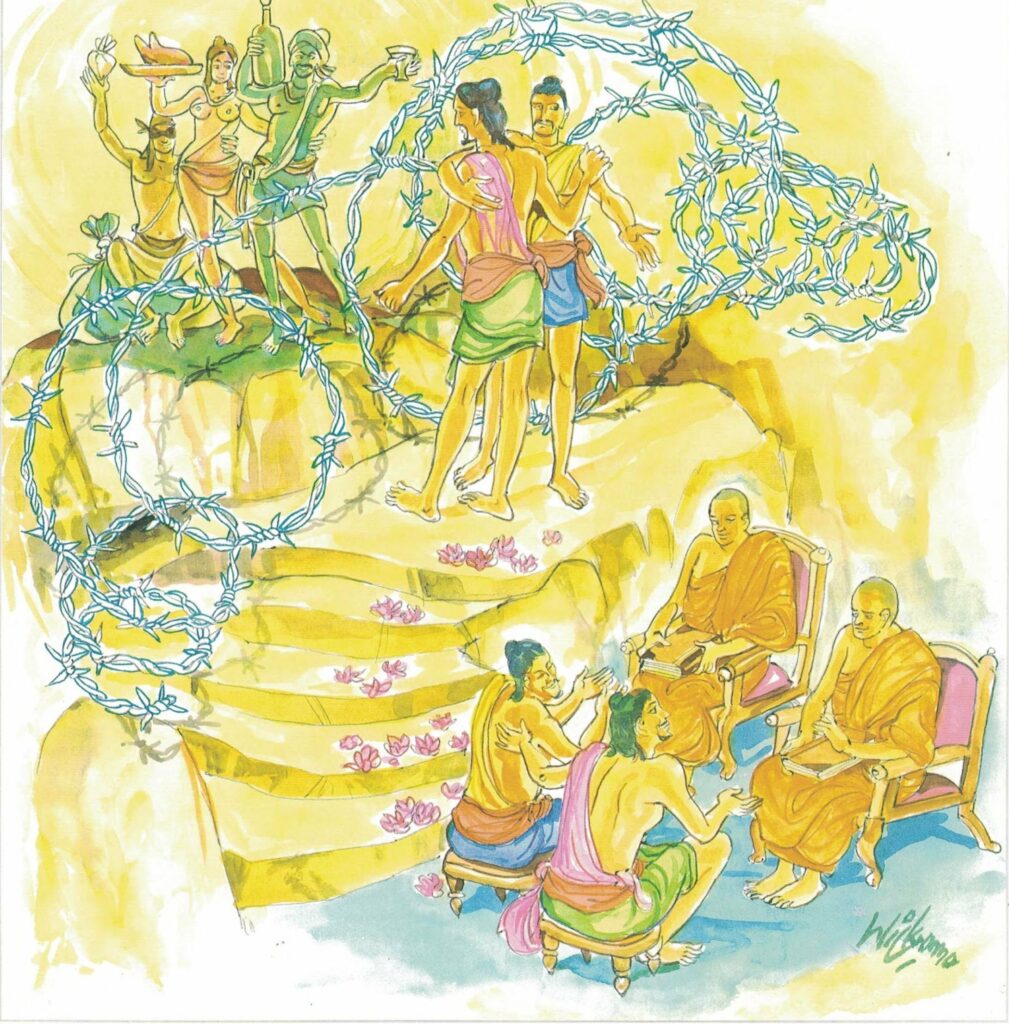Pali text, illustration and English translation of Dhammapada verse 78:
na bhaje pāpake mitte na bhaje purisādhame |
bhajetha mitte kalyāṇe bhajetha purisuttame || 78 ||
78. Don’t go around with evil friends, with rogues do not consort. Spend your time with noble friends, with worthy ones consort.

The Story of Venerable Channa
While residing at the Jetavana Monastery, the Buddha spoke this verse, with reference to Venerable Channa.
Channa was the attendant who accompanied Prince Siddhattha when he renounced the world and left the palace on horseback. When the prince attained Buddhahood, Channa also became a monk. As a monk, he was very arrogant and overbearing because of his close connection with the Buddha. Channa used to say, “I came along with my master when he left the palace for the forest. At that time, I was the only companion of my master and there was no one else. But now, Sāriputta and Moggallāna are saying, ‘We are the chief disciples,’ and are strutting about the place.”
When the Buddha sent for him and admonished him for his behaviour, he kept silent but continued to abuse and taunt the two chief disciples. Thus the Buddha sent for him and admonished him three times; still, he did not change. And again, the Buddha sent for Channa and said, “Channa, these two noble monks are good friends to you; you should associate with them and be on good terms with them.”
In spite of repeated admonitions and advice given by the Buddha, Channa did as he pleased and continued to scold and abuse the monks. The Buddha, knowing this, said that Channa would not change during the Buddha’s lifetime but after his demise (parinibbāna) Channa would surely change. On the eve of his parinibbāna, the Buddha called Venerable Ānanda to his bedside and instructed him to impose the brahma-punishment(Brahmadaṇḍa) to Channa; i.e., for the monks to simply ignore him and to have nothing to do with him. After the parinibbāna of the Buddha, Channa learning about the punishment from monks, felt a deep and bitter remorse for having done wrong and he fainted three times. Then he owned up his guilt to the monks and asked for pardon. From that moment, he changed his ways and outlook. He also obeyed their instructions in his meditation practice and soon attained arahatship.
Explanatory Translation (Verse 78)
pāpake mitte na bhaje. purisādhame na bhaje
kalāyne mitte bhajetha. purisuttame bhajetha
pāpake mitte: bad friends; na bhaje: do not associate; purisādhame: wicked evil people; na bhaje: do not keep company with; kalāyne mitte: worthy friends; bhajetha: associate; purisuttame: noble superior people; bhajetha: keep company with
Do not associate with people who have evil ways. Avoid the company of wicked, evil people who are mean and bad. Associate with worthy friends. Keep the company of noble persons who are superior in quality and virtue and who will be able to elevate you.
Commentary and exegetical material (Verse 78)
Mitta: friend. In Buddhist literature the concept of friend is extensively analysed. In the commentary seven types of friends are indicated. They are:
- pāṇa sakhā: those who are friendly only at drinking bars;
- sammiya sammiyo [sammiya]: those who are friendly only when you meet them;
- atthesu jātesu: those who are friendly only when there is some task at hand;
- upakāraka: those friends who are really friends in need;
- samāna sukha dukkha: those who are always with you at all times whether you are ill or well;
- atthakkāyī: those good friends who lead you along the path to progress, dissuading one from evil;
- anukampaka: they are good friends who are unhappy when you are in misery but are very happy when you are all right. He prevents others when they find fault with you and praises those who praise you.
A good friend is a ‘kalyāṇa mitta’ (benign friend). Pāpa mitta (malign friend) is one who leads you to evil.
In Sigālovāda Sutta (advice to Householder Sigāla) eight (8) types of friends are described. Of these four (4) are good friends. They are
- Upakāraka mitta–a friend who helps you in need;
- Samāna Sukha Dukkha mitta–a friend who is ready even to give his life for you;
- Atthakkhāyī mitta–a friend who protects you against evil;
- Anukampaka mitta–a friend who is happy when you make progress and praises those who speak well of you.
There are four (4) bad friends too. They are
- Aññadatthuhara–a friend who is keen to profit from you;
- Vacīparama–a friend who helps only in words
- Anuppiyabhāṇī–a friend who approves both the good things and the bad things you do
- Apāya Sahāya–a friend who leads you to such evil acts as taking intoxicating drinks.